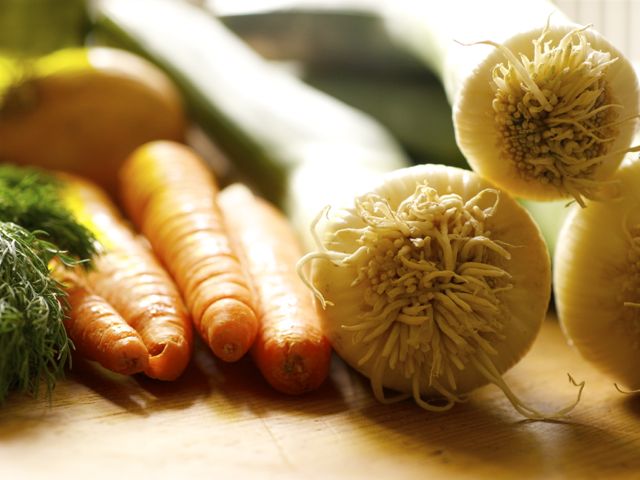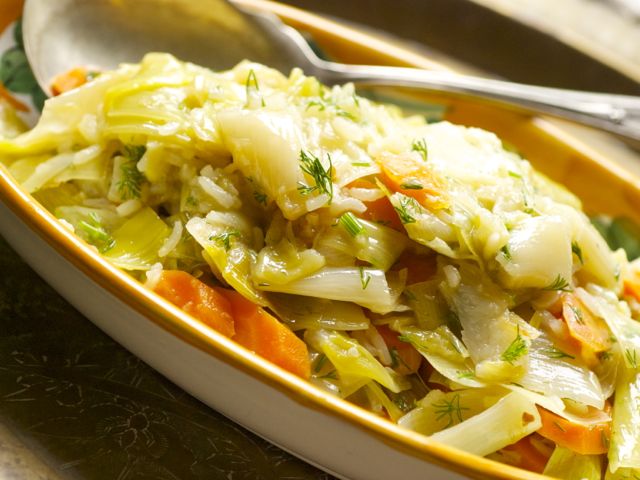
ingreds, l
(article, Adam Ried)
[%adInjectionSettings noInject=true][%pageBreakSettings nobreak=true] I recently discovered a fabulous Turkish method of cooking vegetables. I wish I could attribute the discovery to my explorations in Istanbul, but no. Instead, I was seated at a table with three great friends at Depot 62 Bistro, a cool and unusual Mediterranean restaurant embedded in a furniture gallery in — of all the seemingly unlikely places — Manchester, Vermont. [[block(sidebar). h1.Featured recipes]] Among the dishes we ordered was one called simply “Fresh Leeks” and described as “traditional Mediterranean leeks, carrots and rice baked with olive oil.” I was intrigued not only because I love leeks, but because the preparation sounded both simple and different. Indeed, the leeks were incredible — cooked in the restaurant’s wood-burning oven to a plush softness, punctuated with pieces of sweet carrot, and rich with olive oil. Yet what really stood out was the rice, an unusual addition that gave the dish substance and a sweetness slightly different from that of the carrots. I determined to add this dish to my repertoire. Back at home, I took to a few Turkish cookbooks and to Google. Here’s what I learned: First, leeks are just one of the vegetables cooked in this manner in Turkey. I came across similar recipes for green beans, eggplant, collards, cabbage, and spinach (and I’ve adapted those last two here). [%image ingreds float=right width=400 caption="You don't need much more than leeks, carrots, dill, rice, and olive oil to make a memorable dish."] Second, despite my interpretation of the rice as the distinguishing factor, it was really the olive oil that made the dish. It represented a traditional Ottoman approach to cooking vegetables called Zeytinyagli, which can mean both "olive oil" and "cooked in olive oil" when linked to the name of the item being cooked. So, for instance, pirasa means leeks, and Zeytinyagli pirasa means "leeks cooked in olive oil." Third, the vegetables are cooked fully, to a stage many might call “to death,” but in a good way, rendering them sweet, nutty, satisfying, and comforting — utterly different from veggies cooked "tender-crisp” and bright. Fourth, without fail the recipes recommended cooling the finished dish down and then serving it at room temperature, a perfect make-ahead touch for lazy summer meals. (Being an impatient sort, I tasted all three dishes here while they were still hot or warm, and can heartily attest that they make good eating at higher temperatures, too.) The method amounts to a simple braise: the vegetable in question with some onion and other flavorings, a healthy dose of extra-virgin olive oil, and a braising medium, often water (I substitute chicken broth for a flavor bump). Sometimes a tiny amount of sugar is used to accentuate the vegetables’ own sweetness, and a little lemon juice and fresh herbs added at the end perk things up. [%image reference-image float=left width=400 caption="You serve this leek dish at room temperature, making it a perfect make-ahead recipe for lazy summer suppers."] Then there's the rice that caught my attention. It's just a small amount, sometimes as little as 2 tablespoons; it's ever-present, but never in the spotlight. The explanations I read for the rice were all along the same lines: that it “improves the texture.” Simple enough, and true indeed. In my view, the rice and olive oil combine forces to impart not just heft, but also a lush, earthy sort of softness to the dishes. Topped with a spoonful of thick yogurt and served with a salad and some warm pita alongside, I think these dishes make great light meals in and of themselves. If you need a little something extra, try the untraditional move of topping your portion with an olive oil-fried or poached egg. Any leftovers make a fine base for baked eggs, too. Now, every time I eat these leeks or cabbage or spinach — and I’ve been making them often — I can’t help but wonder: what hidden gem of world cuisine will reveal itself on my next foray into the heart of quaint old New England? (Note to the cosmos: New England is lovely, but I still want to visit Turkey some day!)

ingreds, l

reference-image, l